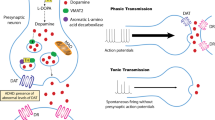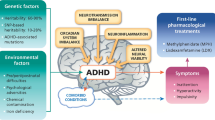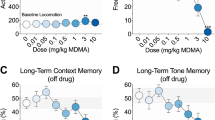Abstract
Rationale
Developmental vitamin D (DVD) deficiency is a candidate risk factor for developing schizophrenia in humans. In rodents DVD deficiency induces subtle changes in the way the brain develops. This early developmental insult leads to select behavioural changes in the adult, such as an enhanced response to amphetamine-induced locomotion in female DVD-deficient rats but not in male DVD-deficient rats and an enhanced locomotor response to the N-methyl-d-aspartate (NMDA) receptor antagonist, MK-801, in male DVD-deficient rats. However, the response to MK-801-induced locomotion in female DVD-deficient rats is unknown. Therefore, the aim of the current study was to further examine this behavioural finding in male and female rats and assess NMDA receptor density.
Methods
DVD-deficient Sprague Dawley rats were assessed for locomotion, ataxia, acoustic startle response (ASR) and prepulse inhibition (PPI) of the ASR to multiple doses of MK-801. The NMDA receptor density in relevant brain regions was assessed in a drug-naive cohort.
Results
DVD deficiency increased locomotion in response to MK-801 in both sexes. DVD-deficient rats also showed an enhanced ASR compared with control rats, but PPI was normal. Moreover, DVD deficiency decreased NMDA receptor density in the caudate putamen of both sexes.
Conclusions
These results suggest that a transient prenatal vitamin D deficiency has a long-lasting effect on NMDA-mediated signalling in the rodent brain and may be a plausible candidate risk factor for schizophrenia and other neuropsychiatric disorders.




Similar content being viewed by others
References
Adams B, Moghaddam B (1998) Corticolimbic dopamine neurotransmission is temporally dissociated from the cognitive and locomotor effects of phencyclidine. J Neurosci 18:5545–5554
Al-Amin HA, Weinberger DR, Lipska BK (2000) Exaggerated MK-801-induced motor hyperactivity in rats with the neonatal lesion of the ventral hippocampus. Behav Pharmacol 11:269–278
Al-Amin HA, Weickert CS, Weinberger DR, Lipska BK (2001) Delayed onset of enhanced MK-801-induced motor hyperactivity after neonatal lesions of the rat ventral hippocampus. Biol Psychiat 49:528–539
Andine P, Widermark N, Axelsson R, Nyberg G, Olofsson U, Martensson E, Sandberg M (1999) Characterization of MK-801-induced behavior as a putative rat model of psychosis. J Pharmacol Exp Ther 290:1393–1408
Angrist B, Vankammen DP (1984) CNS stimulants as tools in the study of schizophrenia. Trends Neurosci 7:388–390
Bakshi VP, Geyer MA (1998) Multiple limbic regions mediate the disruption of prepulse inhibition produced in rats by the noncompetitive NMDA antagonist dizocilpine. J Neurosci 18:8394–8401
Bast T, Zhang WN, Feldon J, White IM (2000) Effects of MK801 and neuroleptics on prepulse inhibition: re-examination in two strains of rats. Pharmacol Biochem Behav 67:647–658
Burne TH, Becker A, Brown J, Eyles DW, Mackay-Sim A, McGrath JJ (2004a) Transient prenatal vitamin D deficiency is associated with hyperlocomotion in adult rats. Behav Brain Res 154:549–555
Burne TH, Feron F, Brown J, Eyles DW, McGrath JJ, Mackay-Sim A (2004b) A combined prenatal and chronic postnatal vitamin D deficiency in rats impairs sensorimotor gating. Physiol Behav 81:651–655
Burne TH, O’Loan J, McGrath JJ, Eyles DW (2006) Hyperlocomotion associated with transient prenatal vitamin D deficiency is ameliorated by acute restraint. Behav Brain Res 174:119–124
Carlsson M, Carlsson A (1989) The NMDA antagonist MK-801 causes marked locomotor stimulation in monoamine-depleted mice. J Neural Transm 75:221–226
Cho AK, Hiramatsu M, Schmitz DA, Nabeshima T, Kameyama T (1991) Pharmacokinetic and pharmacodynamic properties of some phencyclidine analogs in rats. Pharmacol Biochem Behav 39:947–953
Druhan JP, Rajabi H, Stewart J (1996) MK-801 increases locomotor activity without elevating extracellular dopamine levels in the nucleus accumbens. Synapse 24:135–146
Eyles D, Brown J, Mackay-Sim A, McGrath J, Feron F (2003) Vitamin D-3 and brain development. Neuroscience 118:641–653
Faraday M, Grunberg N (2000) The importance of acclimation in acoustic startle amplitude and pre-pulse inhibition testing of male and female rats. Pharmacol Biochem Behav 66:375–381
Harms LR, Eyles DW, McGrath JJ, Mackay-Sim A, Burne THJ (2008) Developmental vitamin D deficiency alters adult behaviour in 129/SvJ and C57BL/6J mice. Behav Brain Res 187:343–350
Hiramatsu M, Cho AK, Nabeshima T (1989) Comparison of the behavioral and biochemical effects of the NMDA receptor antagonists, Mk-801 and phencyclidine. Eur J Pharmacol 166:359–366
Jentsch JD, Roth RH (1999) The neuropsychopharmacology of phencyclidine: from NMDA receptor hypofunction to the dopamine hypothesis of schizophrenia. Neuropsychopharmacology 20:201–225
Kesby JP, Burne THJ, McGrath JJ, Eyles DW (2006) Developmental vitamin D deficiency alters MK 801-induced hyperlocomotion in the adult rat: an animal model of schizophrenia. Biol Psychiat 60:591–596
Kesby JP, Cui X, Ko P, McGrath JJ, Burne TH, Eyles DW (2009) Developmental vitamin D deficiency alters dopamine turnover in neonatal rat forebrain. Neurosci Lett 461:155–158
Kesby JP, Cui X, O'Loan J, McGrath JJ, Burne THJ, Eyles DW (2010) Developmental vitamin D deficiency alters dopamine-mediated behaviors and dopamine transporter function in adult female rats. Psychopharmacology 208:159–168
Ko P, Burkert R, McGrath J, Eyles D (2004) Matemal vitamin D-3 deprivation and the regulation of apoptosis and cell cycle during rat brain development. Brain Res Dev Brain Res 153:61–68
Koch M (1999) The neurobiology of startle. Prog Neurobiol 59:107–128
Krystal JH, Karper LP, Seibyl JP, Freeman GK, Delaney R, Bremner JD, Heninger GR, Bowers MB Jr, Charney DS (1994) Subanesthetic effects of the noncompetitive NMDA antagonist, ketamine, in humans. Psychotomimetic, perceptual, cognitive, and neuroendocrine responses. Arch Gen Psychiat 51:199–214
Lahti AC, Weiler MA, Tamara Michaelidis BA, Parwani A, Tamminga CA (2001) Effects of ketamine in normal and schizophrenic volunteers. Neuropsychopharmacology 25:455–467
Laruelle M, Kegeles LS, Abi-Dargham A (2003) Glutamate, dopamine and schizophrenia: from pathophysiology to treatment. Ann N Y Acad Sci 1003:138–158
Loscher W, Honack D (1992) The behavioural effects of MK-801 in rats: involvement of dopaminergic, serotonergic and noradrenergic systems. Eur J Pharmacol 215:199–208
Mathe JM, Nomikos GG, Schilstrom B, Svensson TH (1998) Non-NMDA excitatory amino acid receptors in the ventral tegmental area mediate systemic dizocilpine (MK-801) induced hyperlocomotion and dopamine release in the nucleus accumbens. J Neurosci Res 51:583–592
McGrath J (1999) Hypotheses: is low prenatal vitamin D a risk-modifying factor for schizophrenia? Schizophr Res 40:173–177
McGrath JJ, Eyles DW, Pedersen CB, Anderson C, Ko P, Burne TH, Norgaard-Pedersen B, Hougaard DM, Mortensen PB (2010) Neonatal vitamin D status and risk of schizophrenia: a population-based case-control study. Arch Gen Psychiat 67:889–894
Meyer U, Nyffeler M, Schwendener S, Knuesel I, Yee BK, Feldon J (2008) Relative prenatal and postnatal maternal contributions to schizophrenia-related neurochemical dysfunction after in utero immune challenge. Neuropsychopharmacology 33:441–456
Moghaddam B (1997) Neurochemical and behavioral studies of dopamine-glutamate interactions in the prefrontal cortex. Biol Psychiat 41:2–2
Moore H, Jentsch JD, Ghajarnia M, Geyer MA, Grace AA (2006) A neurobehavioral systems analysis of adult rats exposed to methylazoxymethanol acetate on E17: implications for the neuropathology of schizophrenia. Biol Psychiat 60:253–264
O’Loan J, Eyles DW, Kesby J, Ko P, McGrath JJ, Burne TH (2007) Vitamin D deficiency during various stages of pregnancy in the rat; its impact on development and behaviour in adult offspring. Psychoneuroendocrinology 32:227–234
Olney JW, Farber NB (1995) Glutamate receptor dysfunction and schizophrenia. Arch Gen Psychiat 52:998–1007
Paxinos G, Watson C (2005) The rat brain in stereotaxic coordinates, 5th edn. Academic Press, Waltham
Rung JP, Carlsson A, Markinhuhta KR, Carlsson ML (2005) (+)-MK-801 induced social withdrawal in rats; a model for negative symptoms of schizophrenia. Prog Neuro-Psychopharmacol Biol Psychiat 29:827–832
Schwienbacher I, Fendt M, Hauber W, Koch M (2002) Dopamine D-1 receptors and adenosine A(1) receptors in the rat nucleus accumbens regulate motor activity but not prepulse inhibition. Eur J Pharmacol 444:161–169
Seeman P (1987) Dopamine receptors and the dopamine hypothesis of schizophrenia. Synapse 1:133–152
Seeman P, Lee T (1975) Antipsychotic drugs: direct correlation between clinical potency and presynaptic action on dopamine neurons. Science 188:1217–1219
Swerdlow N, Koob G (1987) Dopamine, schizophrenia, mania and depression: toward a unified hypothesis of cortico-striato-pallido-thalamic function. Behav Brain Sci 10:197–245
Tarazi FI, Florijn WJ, Creese I (1996) Regulation of ionotropic glutamate receptors following subchronic and chronic treatment with typical and atypical antipsychotics. Psychopharmacology 128:371–379
Tarazi FI, Baldessarini RJ, Kula NS, Zhang KH (2003) Long-term effects of olanzapine, risperidone, and quetiapine on ionotropic glutamate receptor types: implications for antipsychotic drug treatment. J Pharmacol Exp Ther 306:1145–1151
Varty GB, Paulus MP, Braff DL, Geyer MA (2000) Environmental enrichment and isolation rearing in the rat: effects on locomotor behavior and startle response plasticity. Biol Psychiat 47:864–873
Zorrilla EP (1997) Multiparous species present problems (and possibilities) to developmentalists. Dev Psychobiol 30:141–150
Acknowledgements
This work was supported by the National Health and Medical Research Council of Australia.
Conflicts of interest
The authors have no conflicts to disclose.
Author information
Authors and Affiliations
Corresponding author
Rights and permissions
About this article
Cite this article
Kesby, J.P., O’Loan, J.C., Alexander, S. et al. Developmental vitamin D deficiency alters MK-801-induced behaviours in adult offspring. Psychopharmacology 220, 455–463 (2012). https://doi.org/10.1007/s00213-011-2492-0
Received:
Accepted:
Published:
Issue Date:
DOI: https://doi.org/10.1007/s00213-011-2492-0




